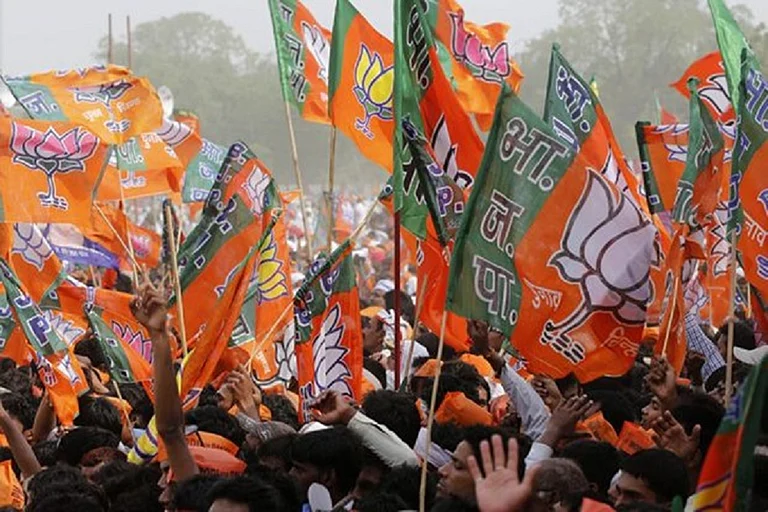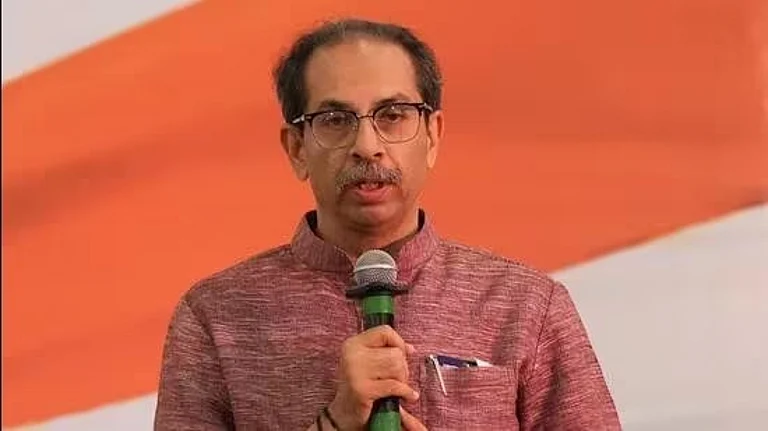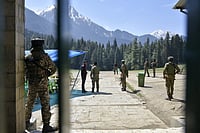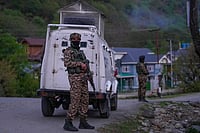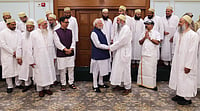Even before the Bharatiya Janata Party (BJP) announced the nomination of independent MP Navneet Rana as its Lok Sabha candidate from Vidarbha’s Amravati constituency, posters undersigned by Me Amravatikar (I am Amravatikar), mysteriously surfaced in the main city centre, warning of her defeat: “Modi ji aapsebairnahi, Rana teri khair nahi” (Our fight is not with Modi, but Rana we won’t spare you).
The decision to ignore opposition from local BJP workers and field Rana, a Tollywood actor-turned-politician was dubbed as ‘political suicide’. It triggered a rebellion within the party and the ruling Mahayuti alliance. She filed the nomination for the Scheduled Caste reserved seat on April 4, only minutes after the Supreme Court upheld the validity of her allegedly fraudulent mochi caste certificate. Follow Lok Sabha Elections 2024 Phase 2 LIVE Updates
Anandrao Adsul, senior leader of Chief Minister Ekanth Shinde’s Shiv Sena faction, refused to campaign for her. Rana had defeated the veteran leader by a margin of 30,000 votes to register her first election victory in the 2019 Lok Sabha elections as an independent candidate. Prahar Janshakti Party (PJP), a local alliance partner of the Mahayuti has fielded rival Sena (Uddhav Thackeray faction) district head, Dinesh Boob, against Rana.
The Amravati constituency, rife with chaos and complex equations behind the scenes, is set to vote on April 26. It is at the centre of Maharashtra’s severe agrarian crisis notorious as the suicide belt, but the plight of Vidarbha’s farmers hardly features in any political discourse. The BJP’s state leadership has been scrambling around in support of Rana, trying to pacify angry party workers of the local unit. Rana has vowed to emerge victorious against Congress’ Balwant Baswant Wankhede, supported by the local cadres of the Maha Vikas Aghadi coalition, even as a large part of the political machinery is working for her defeat. But the Amravati seat considered to be a ‘safe’ one by the BJP could turn out to be an embarrassing spoiler.
A similar pattern is developing across prominent seats in Vidarbha and Marathwada, which are heading for polls in phase 2 of the Lok Sabha elections. Unlike the 2014 and 2019 elections where the BJP and a united Shiv Sena scored decisive victories, the ground realities are not entirely in favour of the ruling alliance, political observers say. “The BJP’s tactics of poaching leaders from rival parties and creating splits in the regional parties has led to resentment and lack of trust among the voters,” points out Sanjay Patil, academic and researcher with Mumbai University.
“The BJP won the opportunity to become the dominant party in Maharashtra twice, but it has not been able to set a larger narrative around its core agenda. The central and state leadership have failed to establish trust by addressing larger public issues on minimum support prices (MSP) to farmers, irrigation, drought, education and health,” he adds.
Under the Mahayuti government, Maharashtra has lost key investments: Vedanta-Foxconn’s semiconductor project, Bulk Drug Park and the Tata-Airbus C-295 transport aircraft project to Gujarat, Himachal Pradesh and Andhra Pradesh respectively. The BJP’s politics does not reflect the people’s interests and the state’s according to Patil’s reading of voter observations from his ongoing field visits in western Maharashtra.
The BJP’s strategic blunders in embracing rival party leaders at whom the party had once trained its guns on for their involvement in financial scams and corruption scandals and allying with the Shiv Sena and the Nationalist Congress Party (NCP) after causing rifts in the parties, have sowed confusion on the ground that may backfire says Patil.
The palpable discontent against the BJP-Shiv Sena-NCP Mahayuti alliance over the failure to resolve the farm crisis and find a solution to the Maratha reservation issue is visible in other prominent seats in Vidarbha, Marathwada and western Maharashtra. Former chief minister Ashok Chavan who switched loyalties from the Congress party and joined the BJP, has been facing people’s ire in his hometown constituency of Nanded. Chavan has secured a Rajya Sabha seat, but his campaign in support of incumbent BJP MP Prataprao Chikhalikar has received a dismal and at times hostile response from the locals.
In the cotton belt of Vidarbha, one of the longest-serving female politicians from Vidarbha, five-time Shiv Sena MP Bhavna Gawli was denied a ticket from Yavatmal-Washim constituency after she joined the Shinde faction following action from the Enforcement Directorate (ED) in a corruption case. CM Shinde was insistent on nominating Gawli for the Lok Sabha seat but after weeks of deliberations and under pressure from the local BJP unit, the ticket was given to Rajashree Patil, wife of Hingoli MP Hemant Patil of the Sena. Shinde also wanted Patil to contest the Hingoli seat, but after declaring his nomination, he was unceremoniously dropped in favour of Sena district chief Baburao Kadam Kohalikar.
The Shinde Shiv Sena has so far nominated its candidates in 11 seats. The party’s leadership is still in hectic discussions with the BJP over the fate of six seats including Mumbai South, Mumbai North Central and Mumbai North West, Nashik, Thane and Palghar, the office of the Shinde Sena said.
The delay in reaching a consensus on candidates, who stand a favourable chance to win the seats as per the ground surveys, has stirred restlessness among the members of the three alliance parties. OBC strongman Chhagan Bhujbal (now with Ajit Pawar NCP) withdrew his nomination from the Nashik seat after a month of waiting for the Mahayuti leadership to announce his candidacy. Both Shinde and NCP’s Ajit Pawar had to compromise and cede constituencies to the BJP against their wishes, says Yashwant Zagade, an academic working on caste politics at Mumbai’s Tata Institute of Social Science (TISS).
The NCP Ajit Pawar faction was forced to give up claims over the Satara constituency, an influential seat in the sugar co-operative-dominated western Maharashtra. After weeks of deliberations, the BJP named influential Maratha strongman Udayanraje Bhosale, the direct descendant of the Maratha warrior king Chhatrapati Shivaji. Bhosale had won the Satara seat on the (united) NCP ticket in 2019. The same year he quit the NCP and joined the BJP. However, in the crucial Lok Sabha by-poll, Sharad Pawar’s close aide defeated Bhosale, proving the party’s dominance in the sugarcane belt. Ajit Pawar’s NCP faction has got only four seats as against the demand of 12 seats. Besides Sunil Tatkare in Raigad and Pawar’s wife Sunetra in Baramati, the party is left with the Shirur and Parbhani constituencies.
For the first time in 33 years, the Sena’s bow and arrow symbol will not be seen during the Lok Sabha elections in the Konkan region. The BJP has fielded union minister Narayan Rane from the Ratnagiri-Sindhudurg seat and the NCP has nominated Tatkare from Raigad. The erstwhile (united) Sena has won the Konkan Lok Sabha constituency since 1996, only facing loss once in 2009. The decision to give up both the seats in the Konkan, was not easy, says Manisha Kayande, spokesperson of the Shinde Sena faction. “As part of an alliance, we have to make such sacrifices,” she says.
The Shinde Sena’s absence in the Konkan could prove to be advantageous to the UBT Sena faction, which will be fighting both seats on the mashaal (flaming torch) symbol. Former union minister Anant Geete will be contesting from Raigad and two-time MP Vinayak Raut from Ratnagiri-Sindhudurg.
While the struggle to get favourable ticket distribution and seat-sharing agreements has generated insecurity and frustrations in the Shinde and Ajit Pawar camps, the calculations appear to be favourable for the BJP in the long run, notes Zagade. “The BJP has been trying for years to enter and make space for itself in the Konkan and western Maharashtra, which have been traditional strongholds of the Shiv Sena and the NCP. The party is looking to establish a long-term presence in this region away from the Sena and the NCP and it has seized this opportunity by nominating its party leaders in Satara and Ratnagiri-Sindhudurg,” he says.
Zagade added that the BJP may not have formidable opposition at the national level, but in Maharashtra, it faces a challenge from the regional parties, which are aggressively campaigning against it across the state. “The UBT Sena and the NCP Sharad Pawar, have a good understanding and complement each other. Even after the BJP decimated their original parties, senior Pawar and Thackeray have adopted an aggressive stance and are leading from the front foot. They are putting up a tough fight and confronting the BJP on several fronts.”
Being the oldest regional parties, the UBT Sena and the Sharad Pawar NCP have a strong presence in several parts of Maharashtra, which will be difficult for the BJP to counter. The two leaders stand to gain significant sympathy from the voters for the way the BJP broke their parties and poached their leaders according to Patil and Zagade. However, there exists a strong possibility of confusion among the elderly and less-informed voters over the symbols of the Sena and the NCP factions. The ‘‘original’’ party name and iconic symbol of Shiv Sena’s bow and arrow and NCP’s clock belongs to the rebel leaders Shinde and Ajit Pawar. Whereas Uddhav Thackeray and Sharad Pawar are campaigning under the new symbols of mashaaland tutari (man with a trumpet).
Ashok S Chousalkar, former head of Political Science at Shivaji University, Kolhapur, does not see confusion or scorching temperatures and the low voter turn-out of 57.82 per cent in during the first phase of polling in Vidarbha as a reflection of political apathy. “People of Maharashtra have a keen interest to watch the revelation of which one is the real Shiv Sena and the NCP, and will come out to vote in large numbers in the coming phases,” he says.
As a Shiv Sainik, Shinde has a strong hold in Mumbai and its extended suburbs of Thane, Kalyan and Ulhasnagar. His work as chief minister and former urban development minister has made him a familiar name in the state, yet he lacks the charisma and appeal to be a pan-Maharashtra leader. Ajit Pawar too faces the litmus test to prove his credibility outside the shadow of his uncle Sharad Pawar’s grand stature. The senior Pawar is pulling out all the stops, including reviving connections with old foes, to ensure his daughter MP Supriya Sule’s victory from Baramati against Ajit Pawar’s wife Sunetra Pawar.
Amidst the complex dynamics of Maharashtra’s political landscape, the BJP will try to bank on certain pockets of influence where its politics holds sway, particularly among upper castes, sections of OBCs and Maratha communities and the diverse middle-class segment. “For the voters, the appeal of the BJP lies in its emotional connection with nationalism, religious polarisation, and freebies given to beneficiaries in the form of various government schemes. The new middle class aspires to be part of the third-largest economy with a GDP of 5 trillion USD. Modi and the BJP are selling these dreams and people are attracted by these factors,” says Chousalkar.
The BJP also holds a strong appeal in the migrant population, which will be key for its victories in urban constituencies. “Maharashtra has a 66 per cent Marathi-speaking population, while the remaining 34 per cent are non-Marathi speaking communities. The BJP holds a strong appeal in the Gujarati, Jain, Marwadi, Punjabi and other groups from north India living here,”
“The answer to these uncertainties will be revealed in the electoral success. The Lok Sabha elections are a primer to the real test in the state assembly elections, which will follow six months from now,” Chousalkar says.







